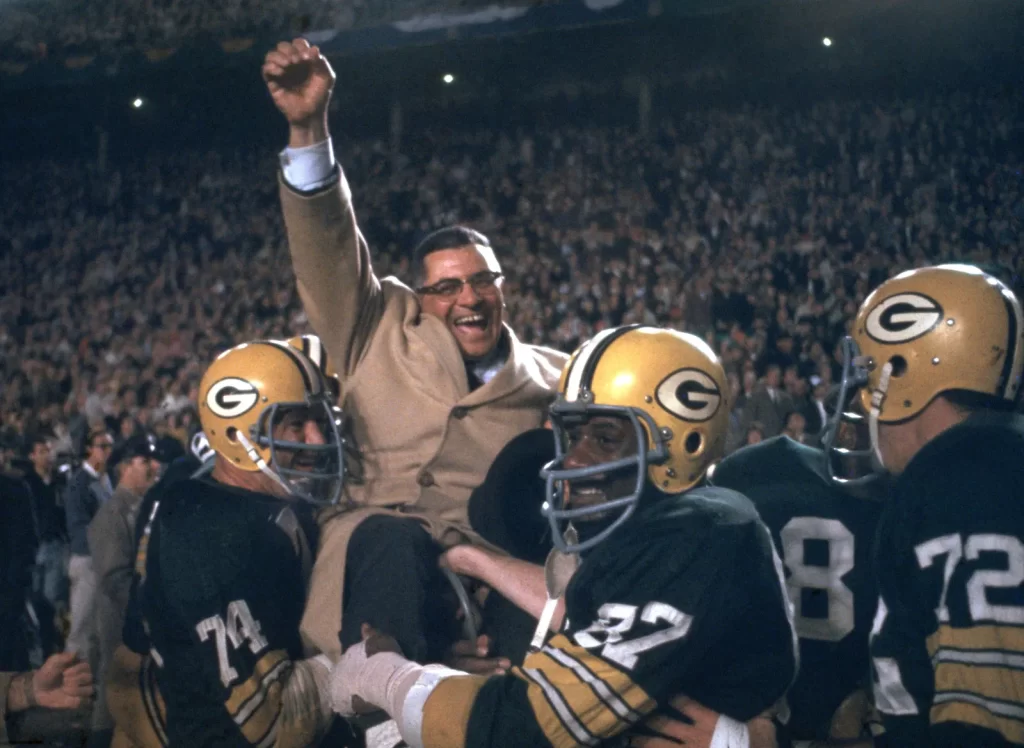You’ll hear a debate quite often on whether coaches or players are more important for success in the National Football League. While this may be a tide that shifts over time, I believe one man is the best argument for the supremacy of coaches.
When Lombardi entered the league, he became an assistant coach of the New York Giants, using some old college connections to earn a promotion from his head coaching position at the U.S. Military Academy at West Point.
Lombardi was the offensive coordinator and Tom Landry, future Cowboys’ Super Bowl winning head coach, was the defensive coordinator. The two coaches stood side by side on the same sideline, not knowing that they would both move on to become two of the greatest to ever coach professional football. They won the National Championship (pre-Super Bowl era), before taking head coaching positions with the Packers and Cowboys respectively.
When Vince Lombardi arrived at the Green Bay Packers, they were a moribund franchise. Many questioned whether such a cold and under-populated market deserved or could even sustain holding an NFL team. The team had failed to find a winning season in the eleven seasons since the retirement of Hall of Fame coach Curly Lambeau, with a combined record of 37-93-2.
In a single offseason, Lombardi turned the team around, leading them to a 7-5 record in 1959. A winning season was enough to partially thaw the frozen fanbase, but nothing could have prepared them for what was to come in the next decade.
In 1960, Lombardi led his team to the League championship. He had pulled underutilized quarterback Bart Starr off the bench and into the starting role. Tragically, the Packers fell to the Eagles 13-17 in the big game that season. As the dejected teammates cleaned out their lockers and prepared to head home, Lombardi had them gather around. He told them, in uncomplicated terms:
“This will never happen again. You will never lose another championship.”
Lombardi was right. In the next eight seasons, the Green Bay Packers would fight their way into five championship games. They did not lose a single one. Across these five championships, they won by a combined 131-63, more than doubling their foes score; a run so dominant that it ushered in the Super Bowl era.
The stress of coaching drove Lombardi into illness, one which he long refused to acknowledge. In September of 1970, Lombardi was diagnosed with cancer of the colon. He held on for ten weeks following the diagnosis, visited by hundreds of former players, coaches, and even opponents. In these weeks, his wife Marie recalls Lombardi talking over ideas for plays and giving advice to his players from on his hospital bed.
One thing Lombardi always preached was a devotion to the team in football, and the idea of the game being bigger than any individual. Marie was by his bedside one night in his final weeks and was startled to hear him rustle around before barking in his sleep, “Joe Namath! You’re not bigger than football. Remember that.” He knew, as he was about to pass on, that a time was coming where hot-shot, self-centered players would change the league.
Marie told friends at the time, “In the end, I think football will break his heart.” His philosophy of football and his ideal of what a team should be, was dying with him.
On the morning of his death, two of his former players woke at the same time, saying that they didn’t know why they were awake, but that all they could think about was Lombardi. Other players took care of the funeral arrangements to allow Marie to rest. At the funeral, a verse was read that had been framed and hung in the locker room, and often spoken directly by Lombardi to his players throughout their five championship run, “Do you not know that those who run in a race all run, but one receives the prize? Run in such a way that you may obtain it.” (1 Corinthians 1:24) In simpler terms: Run to win.
Years later, when a friend asked Marie if she would ever consider getting remarried, she said, “Only if I could find a man who wouldn’t mind staying up until two in the morning, listening to me talk about Vince.”
More than a half-century later, the $112 billion league has shifted in the way Lombardi feared. The focus is money, and the players have power that he only would have predicted in his most exaggerated hypotheses. Still, the players, coaches, and owners of every team in the league fight for one thing every day of every year; the most coveted title in all of American sports: The Vince Lombardi Trophy.

